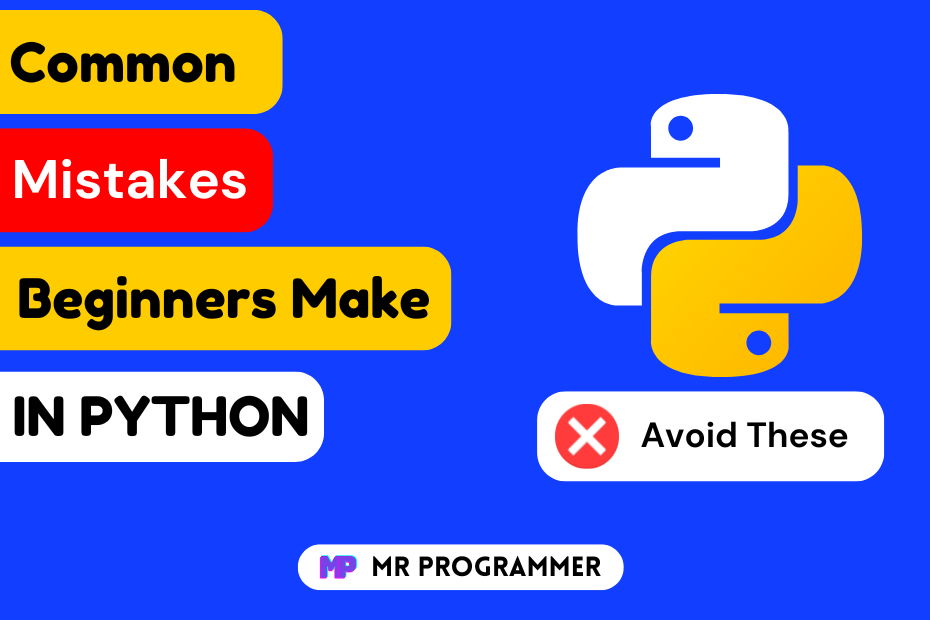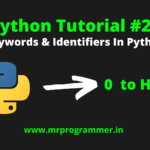Python is a popular language in the programming world, and most coders start their coding journey with Python. And we as Beginners often make some mistakes which we must avoid as a fresher. But in the excitement of starting something new, we end up making mistakes that we regret. So, In this blog post, we will look at some of the common mistakes beginners make in Python, which you should avoid as a newbie.
Some Common Mistakes Beginners Make in Python
1. Misunderstanding Indentations
One of the most common mistakes that beginners make is they misunderstand indentations in Python while coding. Unlike other programming languages that use braces ‘{ }’ to define code blocks, python uses Indentation levels, where each block must be indented consistently.
Also Read: How to Check Python Version In Windows, Mac, And Linux – Complete Guide
Example of Incorrect Indentation
if True:
print("This will cause an IndentationError")
Correct Indentation
if True:
print("This is correctly indented")
Tip to Avoid This Mistake
Always check that code blocks are intended correctly and make use of an IDE or code editor that highlights that indentation levels, so that it can prevent such errors.
2. Incorrect Use Of Variables
As beginners, we often use variables the incorrect way, and make mistakes in naming, scope management, and type handling.
Some common Errors
- Naming mistakes:
myVariable = 10
myvariable = 20
print(MyVariable) # This will cause a NameError
2. Scope misunderstanding:
def my_function():
x = 10
print(x) # This will cause a NameError as x is not defined outside the function
3. Type Errors:
a = "5"
b = 10
print(a + b) # This will cause a TypeError
Tip to Avoid This Mistake
- Use a descriptive name that completely defines your variable
- Understand variable scope
- Be mindful of variable types and conversions.
3. Improper Handling of Lists and Loops
Lists and Loops are a basic concept in Python, but they can be confusing for beginners:
Some common mistakes
- Modifying Lists while iterating:
numbers = [1, 2, 3, 4]
for num in numbers:
if num % 2 == 0:
numbers.remove(num)
2. Off-by-One Errors in Loops:
for i in range(5):
print(i) # Beginners often confuse range(n) with including the end value n
Tip to Avoid This Mistake
- Avoid modifying lists while iterating. Instead, create a new list or use list comprehensions.
- Understand how the ‘range()’ function works.
4. Misusing Functions
Functions are crucial for code reusability and organization, but beginners often misuse them.
Some common Errors
- Not Defining Functions Properly:
def my_function
print("Hello, World!")
2. Improper Argument Handling:
def greet(name):
print("Hello, " + name)
greet() # This will cause a TypeError
Tip to Avoid This Mistake
- Make sure functions are defined correctly with proper syntax.
- Handle function arguments appropriately and provide default values where necessary.
5. Ignoring Error Handling
Beginners often ignore error handling, leading to unhandled exceptions and crashes.
Some common mistakes
- No Error Handling:
num = int(input("Enter a number: "))
print(10 / num) # This will crash if num is zero
2. Overly Broad Exception Handling:
try:
# some code
except Exception:
print("Something went wrong") # This catches all exceptions, including unexpected ones
Tip to Avoid This Mistake
- To avoid this mistake as beginners, we should use try-except blocks to handle specific exceptions.
- Avoid catching overly broad exceptions.
6. Ignoring Pythonic Conventions
Python has a set of conventions known as “Pythonic” ways of writing code. Beginners often ignore these, leading to less readable and maintainable code.
Some common Errors
- Ignoring PEP 8 Guidelines:
def my_function():print("Hello, World!")
2. Not Using List Comprehensions:
squares = []
for x in range(10):
squares.append(x**2)
Tip to Avoid This Mistake
- Follow PEP 8 guidelines for writing Python code.
- Make use of list comprehensions for creating lists in a more readable way.
7. Overcomplicating Code
As beginners, we sometimes overcomplicate our code by using unnecessary loops, conditionals, or complex structures.
Some common Errors
- Unnecessary Loops:
result = []
for item in my_list:
if the item not in result:
result.append(item)
2. Overly Complex Conditionals:
if x > 10:
if x < 20:
print("x is between 10 and 20")
Tip to Avoid This Mistake
- As a beginner, you should keep your code as simple as possible.
- Make use of Python’s built-in functions and libraries to handle common tasks.
8. Not Leveraging Python Libraries
Python has a huge collection of libraries, but beginners often create their own solutions instead of using these pre-made tools.
Common Errors
- Rewriting Existing Functions:
def calculate_mean(numbers):
return sum(numbers) / len(numbers)
# Instead of using: import statistics; statistics.mean(numbers)
2. Ignoring Standard Libraries:
import os
import sys
import math
# Not using these can lead to writing more complex and error-prone code.
Tip to Avoid This Mistake
- Familiarize yourself with Python’s standard library, and use their pre-made functions rather than building your own.
- Use libraries like NumPy, Pandas, and Requests to simplify your code.
9. Inadequate Testing and Debugging
Testing and debugging are critical skills in programming. Beginners often neglect these, which leads to bugs and unreliable code.
Some common mistakes
- Not Testing Edge Cases:
def divide(a, b):
return a / b
print(divide(10, 2)) # Works fine
print(divide(10, 0)) # This will crash
2. Ignoring Deubbing Tools:
print("Using print statements for debugging isn't always the most effective method.")
Tip to Avoid This Mistake
- Write tests for edge cases.
- Use debugging tools like pdb (The Python Debugger) or IDE features to debug more effectively.
Conclusion
Learning Python is an exciting journey, but it comes with its set of challenges, by being aware of common mistakes and how to avoid them, beginners can make their learning process smoother and more effective. Remember to practice consistently, seek feedback, and always write a clean, readable, and effective code.
- AI 101: An Overview of the Different Types of Artificial Intelligence - June 13, 2024
- 9 Common Mistakes Beginners Make in Python - June 2, 2024
- OpenAI Scrambles to Rebuild Trust: Safety Committee Formed After Departures - May 28, 2024










